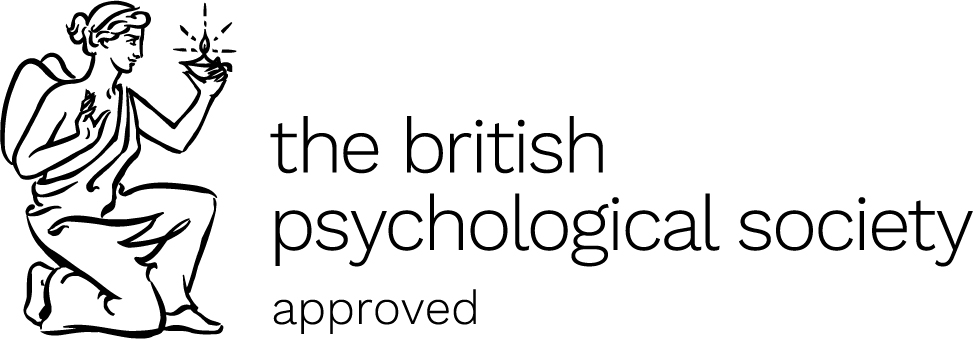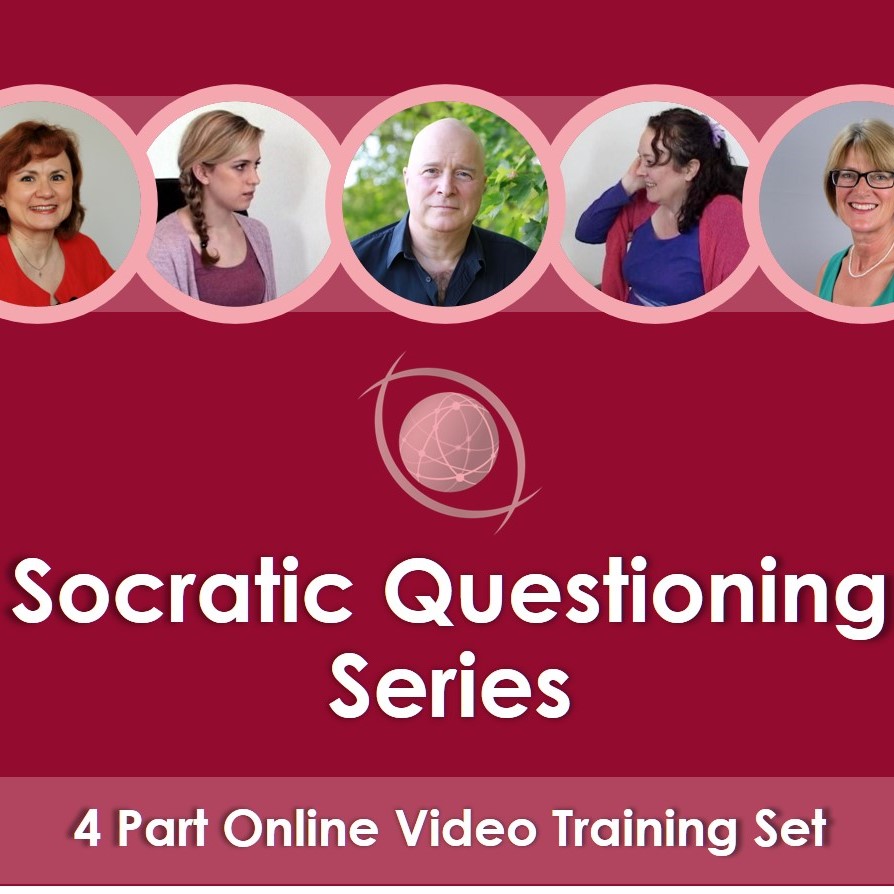
Course Brief
Socratic Questioning is a psychotherapeutic key tool for both understanding a client’s perceptions and subsequently helping them to change them. It has been described by Padesky as “the cornerstone of cognitive therapy”, but can be used in other approaches as well as a useful communication tool.
This course is part of the training programme that enables you to complete the BPS Approved Master Practitioner Diploma in CBT.
LIVE on Zoom – attendance required. The course will be as a recording afterwards but ONLY to those who attended the course LIVE on Zoom.
Socratic Questioning (SQ) is a psychotherapeutic key tool for both understanding a client’s perceptions and subsequently helping them to change them.
Described by Padesky as “the cornerstone of cognitive therapy” it was first given centre stage psychotherapeutically by Adler in the early 20th century, who in turn greatly influenced Carl Rogers. The technique has also been compared to the characteristics of Circular Questioning used in Family Therapy and has been utilised within the personal coaching field, so it can be used in various therapeutic approaches as a useful communication tool.
SQ is a key skill for all therapists (CBT and otherwise) to develop. It enables both therapist and client to engage in the process of “guided discovery” to make sense of the client’s internal and external world which they have the knowledge to answer. As a result the client initiates their own perceptual and cognitive changes.
The technique is especially useful in assessment and formulation, changing unhelpful cognitions, exploring new ways of thinking about things, problem solving and devising behavioural experiments. It also acts as a useful counter balance to any therapist tendencies towards “psycho-bulldozing” (Westbrook 2007). It helps develop therapist skill both in making no assumptions whatsoever about the client’s experience (until the client has told you) and fine-tuning the therapist’s curiosity about the client’s view of things.
To read more about the importance of SQ as the essential tool for any therapist - click on the Preparation Tab above.
This workshop offers a comprehensive introduction to Socratic Questioning, including an overview of its principles and a structured approach (CARPIS Questions) for its application. Participants will have ample opportunities to observe Socratic Questioning in action and practice it themselves. They will also receive gentle constructive feedback to refine their skills and continue developing their expertise beyond the course.
We place particular emphasis on using Socratic Questioning for Eating Disorders and Obesity. While we offer a dedicated course on this topic, in years when that course is not available, this Socratic Questioning Workshop serves as a valuable alternative. The Tutor will provide specific case examples and tailored approaches for working with this client group.
This course is part of the training programme that enables you to complete the BPS Approved Master Practitioner Diploma in CBT. You can build up gradually your CBT training portfolio by attending all the courses within the programme at the pace that suits you. All your training hours will be calculated, recorded in an individual validated log and accumulated towards your full Diploma or Certificate.
This highly experiential and practical course is delivered LIVE in the room or on Zoom over two consecutive days.
LIVE on Zoom – attendance required.
The course will be as a recording afterwards but ONLY to those who attended the course LIVE on Zoom.
Issues covered include:
- What is Socratic Questioning and what can it offer to therapist and client
- The use of CARPIS Questions
- Using Socratic Questioning in problem formulation
- Key “Dos” and “Don’ts” in Socratic Questioning
- Socratic Questioning and challenging NATs
- Using Socratic Questioning in Problem Solving and alternative Perspectives and Outcomes
- Wide range of case material illustration inc. traumatic events, depression and eating problems
Frequently asked questions:
Q: Explain why Socratic Questioning is important for therapists?
A: Socratic Questioning (SQ) is a vital technique for therapists because it facilitates a deeper understanding of a client’s thoughts, emotions, and behaviours, ultimately helping them develop healthier perspectives and solutions. Here’s why it’s important:
-
Encourages Insight and Self-Discovery SQ helps clients reflect on their beliefs, assumptions, and reasoning. By gently exploring their thoughts, therapists enable clients to uncover inconsistencies or distortions, fostering self-awareness and deeper insight into their own mental processes.
-
Promotes Cognitive Restructuring This method is central to Cognitive-Behavioural Therapy (CBT), as it encourages clients to examine the accuracy of their thoughts and replace unhelpful beliefs with healthier, evidence-based perspectives. This process can significantly reduce symptoms of anxiety, depression, and other mental health issues.
-
Strengthens Problem-Solving Skills By guiding clients to think critically and evaluate alternatives, SQ empowers them to develop problem-solving strategies. This skill-building process increases their confidence in handling challenges independently.
-
Enhances Collaboration SQ creates a collaborative therapeutic relationship. Instead of providing direct advice, the therapist uses curiosity and open-ended questions to guide the client toward their own conclusions, fostering trust and mutual respect.
-
Addresses Cognitive Distortions Clients often have automatic thoughts that are unhelpful or distorted (e.g., catastrophizing, black-and-white thinking). SQ helps them explore and challenge these patterns, paving the way for healthier cognitive processes.
-
Builds Lasting Change By equipping clients with the tools to critically evaluate their own thoughts and beliefs, SQ ensures the benefits of therapy extend beyond sessions. Clients learn how to apply this approach in real-life situations, making it a sustainable method for long-term well-being.
-
Fosters Emotional Regulation Exploring underlying beliefs and challenging irrational thinking allows clients to experience more balanced emotions. As they gain clarity, they feel less overwhelmed by their thoughts and more in control of their emotional responses.
Conclusion Socratic questioning is not just a technique but a philosophy of guided discovery. By helping clients think more clearly, challenge their own assumptions, and develop problem-solving skills, therapists empower them to make meaningful, lasting changes in their lives. For therapists of all therapeutic modalities mastering SQ skills is essential to delivering effective, client-centered care.
Q: Can Socratic questioning be used for working with eating disorders and obesity?
A: Yes, SQ can be highly effective when working with clients dealing with eating disorders and obesity. SQ encourages clients to explore their thoughts, beliefs, and assumptions driving their behaviours and emotions related to food, body image, and self-worth. Here’s just a few examples of how it can be applied:
-
Challenging Core Beliefs About Food and Body Image Many individuals with eating disorders hold rigid, unhealthy beliefs, such as "My worth is defined by my weight" or "I must be thin to be loved." SQ helps uncover these core beliefs and examine their origins, validity, and impact.
-
Identifying Cognitive Distortions Eating disorders and obesity are often linked to cognitive distortions, such as all-or-nothing thinking (e.g., "If I eat one cookie, I’ve completely failed") or catastrophizing (e.g., "If I gain weight, no one will accept me"). Therapists use SQ to explore these distortions, encouraging clients to view situations in a more balanced and realistic way.
-
Reducing Emotional Eating Many individuals with obesity or eating disorders engage in emotional eating to cope with stress, anxiety, or sadness. SQ can help clients explore the connection between their emotions and eating habits, uncovering alternative coping strategies.
-
Increasing Awareness of Triggers Both eating disorders and obesity are often maintained by unexamined habits and triggers (e.g., stress, social situations, or negative self-talk). SQ helps clients explore and understand their triggers, empowering them to develop healthier responses.
-
Fostering Motivation for Change Many clients feel ambivalent about making changes to their eating habits. SQ can address this by exploring the pros and cons of their current behaviours versus potential changes.
-
Developing Self-Compassion Self-criticism and shame are common among individuals with eating disorders and obesity, perpetuating unhealthy behaviours. SQ helps clients reframe these thoughts and develop a more compassionate view of themselves.
Conclusion SQ is a powerful tool for addressing the cognitive and emotional aspects of eating disorders and obesity. It enables clients to challenge harmful beliefs, gain insight into their behaviours, and develop healthier ways of thinking and coping. Combined with other therapeutic approaches, it can play a crucial role in promoting recovery and lasting change.
Click here for the full SDS Accreditation terms for the BPS Approved Master Practitioner Diploma in CBT: https://skillsdevelopment.co.uk/certificates/cbt_diploma/
Course Tutor
Testimonials
Recommended Materials

Socratic Questioning (Essential CBT Skills Series) - 4 CPD Hours
Despite lots of references to SQ as a cornerstone of cognitive therapy (C.Padesky, 1993), there is very little, almost nothing, written about it and how to conduct it. This 4 hours online video course is an attempt to give practitioners clear explanation of SQ process, guidance about its use and practical examples/demonstrations.



